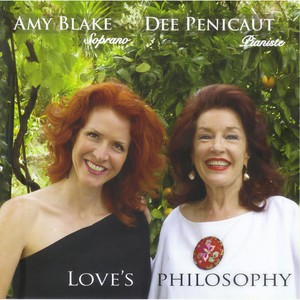
Love's Philosophy
- 歌唱: Dee Penicaut/ Amy Blake
- 发行时间:2014-09-30
- 唱片公司:Kdigital Media, Ltd.
- 类型:录音室专辑
- 歌曲
- 时长
-
作曲家:John Ireland
-
作曲家:Roger Quilter
-
作曲家:Johannes Brahms( 约翰内斯·勃拉姆斯)
-
作品集:8 Lieder and Songs, Op. 59 No. 8
-
作曲家:Johannes Brahms( 约翰内斯·勃拉姆斯)
-
作品集:5 Lieder, Op.105 No. 1
-
作曲家:Francesco Paolo Tosti
-
作曲家:Reynaldo Hahn( 雷纳尔多·哈恩)
-
作曲家:Reynaldo Hahn( 雷纳尔多·哈恩)
-
作品集:7 Chansons grises( 7首灰色香颂)
-
作曲家:Achille-Claude Debussy( 阿希尔-克洛德·德彪西)
-
作曲家:Achille-Claude Debussy( 阿希尔-克洛德·德彪西)
-
作品集:Fêtes galantes I, L. 80
-
作曲家:Gabriel Fauré( 加布里埃尔·福雷)
-
作品集:2 Songs, Op. 46
-
作曲家:Gabriel Fauré( 加布里埃尔·福雷)
-
作品集:3 Songs, Op. 7( 3首艺术歌曲,Op. 7)
-
作曲家:Henri Duparc
-
作曲家:Françis Poulenc
-
作品集:Fiançailles Pour Rire, FP 101
-
作曲家:Richard Strauss( 理查德·施特劳斯)
-
作品集:8 Poems for High Voice & Piano, Op. 10
-
作曲家:Richard Strauss( 理查德·施特劳斯)
-
作品集:4 Lieder, Op. 27
-
作曲家:Sergei Rachmaninoff
-
作品集:15 Romances, Op. 26( 15首浪漫曲,Op. 26)
-
作曲家:Sergei Rachmaninoff
-
作品集:6 Romances, Op. 4( 6首浪漫曲,Op. 4)
-
作曲家:Manuel De Falla
-
作品集:Siete Canciones Populares Españoles
简介
"When I met Dee Penicaut, I instantly felt attracted to her way of playing and above all, her tireless research for artistic truth and beauty. I have enjoyed immendsely working on these songs with her. Her knowledge of the composers and their intentions, and her tenacious desire to allow the flow of the musical line have enriched my own music making. I hope you enjoy our choice of songs as much as we enjoyed working on them." Amy Blake Two women, one from Australia and the other from Texas meet up on the Côte d'Azur, France and begin to work on song litterature together. Here they present their favorite French mélodies, German lieder, Russian songs and Spanish canciones. Their choices take the listener on a fabulous fresh journey. Love's Philosophy, the poem by P.B. Shelley gives its name to this collection and invites you to travel with pianist Dee Penicaut and soprano Amy Christianna Blake. You will immediately feel the vibrant colors of Spanish love, warm and sweet in "Nana" or scarlet and intense in "Polo" by Manuel de Falla. The same poem by Paul Verlaine "Clair de lune" put to music by Claude Debussy then Gabriel Fauré will amaze you with two very different innovative approaches. The sensous music of Reynaldo Hahn will seduce then the meltingly beautiful phrases of "Chanson triste" by Henri Duparc will leave you asking for more. Francis Poulenc takes us into the twentieth century producing the elegant "Fleurs" with the subtle complicity of Louise de Vilmorin. Written by Sir Francesco Paolo Tosti, "Sogno" celebrates 'salon music' of the Belle Epoque in the London of Charles Dickens. The change of color is dramatic as Pushkin and Rachmaninoff lead us across the steppe of Russia. The "Georgian Song" is a poignant lamentation at the separation from the beloved homeland. To restore one's hope in love, there is the promise of tomorrow. "Morgen", a poem by John Henry Mackay, a Scottish born Germanist and Anarchist writer, is put to music by Richard Strauss who then also sets "Zueignung" which sings of devotion and gratitude for loving and being loved. To celebrate love for Music and the Beloved, Johannes Brahms sets "Wie Melodien zieht es mir" and "Dein Blaues Auge."

